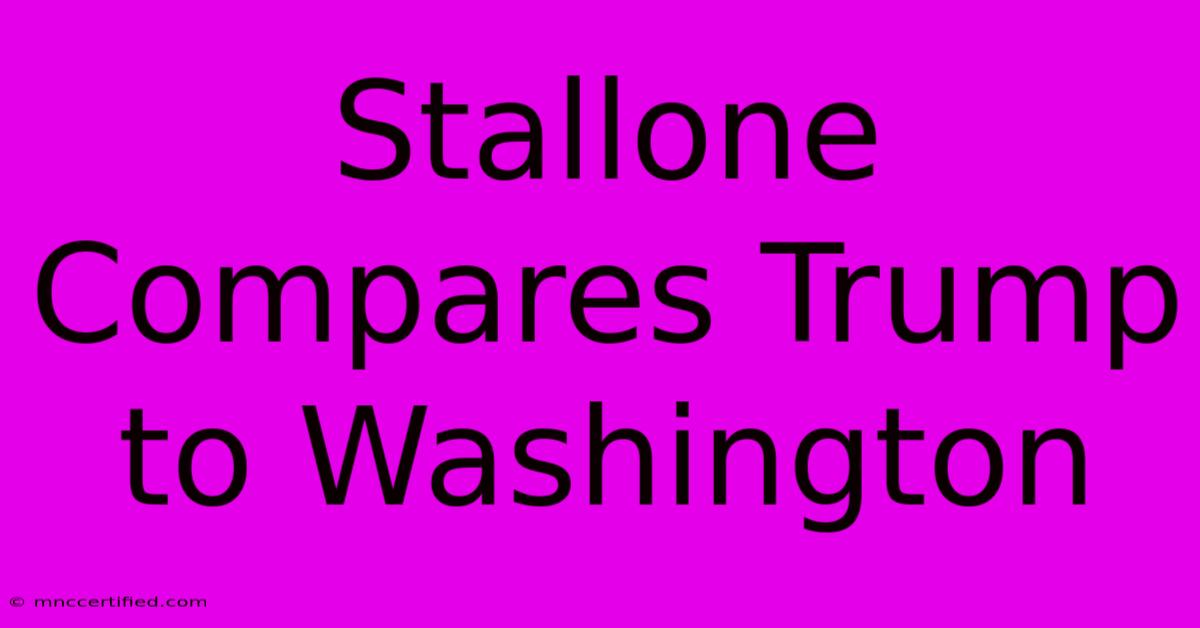Stallone Compares Trump To Washington

Table of Contents
Stallone Compares Trump to Washington: A Controversial Analogy
Sylvester Stallone, the iconic action star, recently sparked a firestorm of debate with a comparison between Donald Trump and George Washington. While the comparison itself is striking, the context and implications are even more complex, demanding a closer look at the historical figures involved and the political climate fueling the conversation. This article delves into Stallone's controversial statement, exploring its meaning, the ensuing backlash, and its relevance in the current political landscape.
The Statement and its Interpretation
Stallone's comparison, made during a recent interview (insert source if available), wasn't a direct equivalence. He didn't claim Trump was Washington, but rather alluded to shared characteristics, possibly focusing on certain aspects of their presidencies or leadership styles. The precise wording is crucial, as nuanced language can dramatically alter the interpretation. Was Stallone highlighting their leadership during times of upheaval? Their controversial policies? Or perhaps their strong personalities and unwavering determination? Without the exact quote, definitive conclusions are difficult. However, the very act of comparing a figure like Trump, often associated with controversy and populist rhetoric, to the revered Founding Father George Washington, immediately creates a point of contention.
Key Differences and Similarities: A Critical Analysis
The comparison invites a crucial examination of both presidents. George Washington, despite his slave-owning past (a significant blemish on his legacy), is generally viewed as a pivotal figure in American history, embodying ideals of national unity and leadership during the nation's formative years. Donald Trump, on the other hand, is a vastly different figure, with a presidency marked by polarization and unprecedented challenges to democratic norms.
Any perceived similarities would likely need to be carefully scrutinized. Did Stallone perhaps allude to:
- Strong leadership during challenging times? Both Washington and Trump faced significant challenges during their respective terms.
- Decisive action despite opposition? Both men were known for making bold decisions, often in the face of fierce opposition.
- A populist appeal to a certain segment of the population? Both men connected with specific demographics through their rhetoric and policy stances.
However, significant differences overshadow any possible parallels:
- Respect for democratic institutions: Washington's commitment to democratic principles stands in stark contrast to Trump's actions and statements challenging these very institutions.
- Integrity and ethical conduct: The contrast between Washington's (albeit flawed) commitment to public service and Trump's numerous controversies is undeniable.
- Long-term impact on the nation: Washington's contributions to the foundation of the United States are unparalleled, while Trump's lasting impact remains a subject of ongoing debate and analysis.
The Backlash and Public Reaction
Stallone's comparison predictably ignited a firestorm of criticism. Many felt the comparison trivialized Washington's legacy and ignored the significant differences between the two presidents. Social media erupted with commentary, with many expressing outrage and disbelief. The reaction underscores the deep political divisions within the United States, highlighting the highly sensitive nature of comparing such polarizing figures.
Analyzing the Public Discourse
The public response reveals several key aspects:
- The power of historical figures: The use of Washington's name inevitably invokes strong emotional responses.
- Political polarization: The intensity of the reaction showcases the deeply entrenched political divides in contemporary society.
- The need for nuanced historical analysis: The debate highlights the importance of considering historical context and avoiding simplistic comparisons.
Conclusion: Context Matters
Stallone's comparison of Trump to Washington, even if intended as a subtle observation, lacks the necessary nuance and context. While highlighting specific, carefully defined similarities might be possible, ignoring the vast gulf in their legacies and approaches to governance renders the analogy fundamentally flawed. The intense reaction highlights the sensitivity surrounding the reputations of both historical and contemporary political figures, emphasizing the need for careful consideration and balanced analysis in public discourse. The discussion underscores the ongoing challenges in navigating political discourse in an increasingly polarized society.

Thank you for visiting our website wich cover about Stallone Compares Trump To Washington. We hope the information provided has been useful to you. Feel free to contact us if you have any questions or need further assistance. See you next time and dont miss to bookmark.
Featured Posts
-
Estrella Insurance Fort Lauderdale
Nov 16, 2024
-
Portugal Vs Poland Live Match Updates
Nov 16, 2024
-
Cobra Kai Recap Season 6 Episode 6
Nov 16, 2024
-
Children In Need 2024 Tv And I Player
Nov 16, 2024
-
Stallone Likens Trump To George Washington
Nov 16, 2024